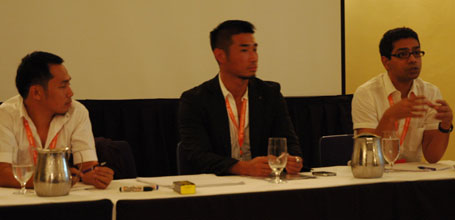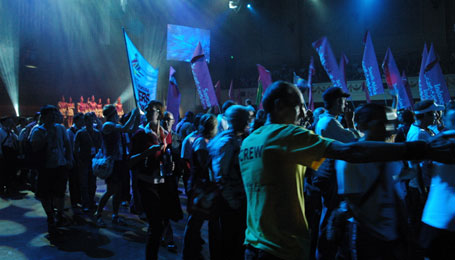After the closing keynote address at the conference by commissioner Graeme Innes AM, delegates and participants attended a cocktail party at the town hall held by Outgames conference partner IBM. At the same time a parade of Outgames competitors made its way through the Melbourne streets before entering the town hall ballroom to cheers from the crowd. Martial arts and dance performances entertained the audience, who also enjoyed music from Melbourne performer Tania Doko. The highlight of the evening was the closing act from the stage show Priscilla Queen of the Desert.

Catherine Meade and Wessel van Kampen welcomed delegates and participants on behalf of GLISA (Gay and Lesbian International Sport Association). Workshops on community advocacy, young people, health and cultural events were held in the morning and in the afternoon cultural and historical tours of Melbourne were led by Outgames volunteers.
Anton Enus, out SBS World News presenter and Gay and Lesbian Health Victoria patron was Master of Ceremonies at the plenary session on Jan 31. He stressed that while some within the LGBT community felt LGBT events were not the priority they used to be, "recent gay bashings in Sydney and the vilification in Australia of high profile out public figures by politicians were evidence that sexual minorities still needed to work together" to combat abuse and prejudice against LGBT people throughout the Asia Pacific.
Former New Zealand MP Georgina Beyer, who became the world's first openly transsexual Member of Parliament when she was elected in 1999, gave a passionate speech about the virtue of civil unions and the New Zealand Prostitution Reform Act, which has safeguarded the human rights of sex workers. In particular, the act has benefited the many transgender people involved in the sex work industry in New Zealand.
Beyer welcomed the recent election of the Rudd Labor government in Australia but feared the reverse may be about to happen in New Zealand where "voter apathy with the Helen Clark government may lead to the election of a conservative government who may undo much of the progressive work done by the labour party on human rights for LGBT people."
The colonial legacy of anti-homosexual legislation and the residual effect it has on contemporary LGBT lives throughout the Asia Pacific was a recurrent topic at the conference.
ILGA co-secretary Rosanna Flamer-Caldera spoke of the backlash against advocacy efforts in Sri Lanka to repeal section 365 of the Sri Lankan legal code which criminalises same-sex acts between men. In 1995, the amendment to section 365 only served to broaden the provisions for prosecuting homosexuality by creating section 365A that criminalised same-sex acts between women.

Forty-one out of 53 or 77 percent of Commonwealth countries criminalise consensual same-sex acts among adults. He stressed that the laws violate the human rights of privacy, equality, human dignity and life, and furthermore that these laws present a major obstacle to effective HIV outreach programs.
Stuart Koe (above, middle), Fridae CEO, detailed the organisation and lobbying behind the petition to repeal section 377A of the Singapore criminal code in late 2007.
The influence of the Christian church and Christian beliefs still impedes the progress of furthering LGBT human rights in many Asian countries, delegates said.
Jonas Bagas (above, left), secretary general of the Philippines Lesbian and Gay Legislative Advocacy Network emphasised the importance of strategy in LGBT advocacy in the Philippines.
"Same-sex marriage is not something the LGBT movement in the Philippines could advocate because of the power and legacy of the Catholic Church."
Elizabeth Kerekere, a board member of the Lesbian and Gay Archives of New Zealand discussed the disappearance of same-sex loving and living in Maori culture under Christian missionaries in New Zealand at the Cultural Identity and Sexuality/Gender session.
In the same session Dede Oetomo outlined the diversity of indigenous LGBT identities in Indonesia and how these identities are under attack from Christianity, Islam, modernity, development and from within the indigenous peoples' movement itself.
At the plenary session Oetomo highlighted the historical relevance of indigenous LGBT cultures in Indonesia.
"LGBT indigenous cultures are nothing from the outside (of Indonesia). We have been living with these cultures in our community up to the present day from our own ancestors."
Ian Anderson, director for the Center for Health and Society and the Onemda VicHealth Koori Health Unit - University of Melbourne, reflected on his involvement in the working party which framed the first National Indigenous Australian Sexual Health Strategy which was launched by the Australian National Council on AIDS and Related diseases in 1997. He discussed the challenges of navigating a process that engaged the political processes of the indigenous movement, the gay and lesbian community and the HIV/AIDS sector.
Other sessions included health, sport, education, and workers rights. Asia Pacific Outgames conference partner IBM was represented by Mark Latchford at the business session where he continued to promote IBM's well established diversity policy. Koe spoke of diversity at www.fridae.com on the same panel.
Beyer and Oetomo read excerpts from the Melbourne Declaration at the opening ceremony, a continuation of the Outgames' work on furthering LGBTIQ human rights. The Melbourne Declaration forms part of the 1st Asia Pacific Outgames legacy in the approach to the 2nd international Outgames in Copenhagen in 2009.
Rosanna Flamer-Caldera best summarised the mood of the conference in her closing remarks to the plenary session: "We have made great strides in the LGBT movement but there is still much to do. I envision a time when organisations like ILGA won't be necessary. This is what I aspire to, this is what I hope for."
The Asia Pacific Outgames end on Sunday 3 February in conjunction with the Melbourne 2008 Pride March.












 打印版本
打印版本










读者回应
请先登入再使用此功能。